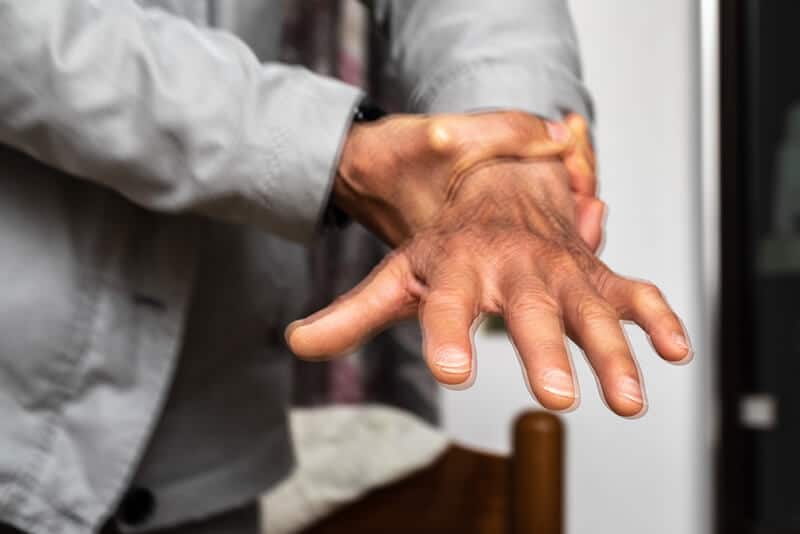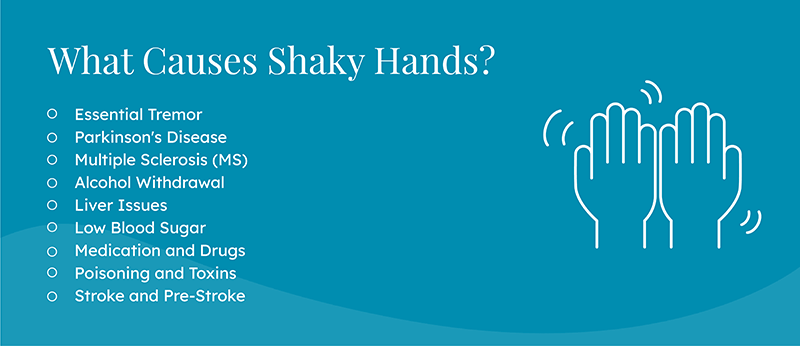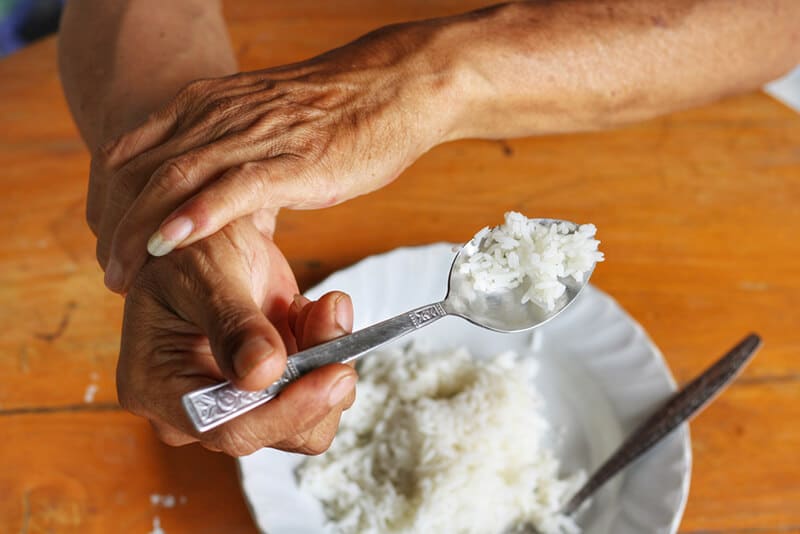Hand Tremors Explained

Hand tremors, also known as shaky hands, can interrupt your daily life. Tremors in hands can vary in their magnitude, frequency, and progression over time. Your tremor might make specialized movements like threading a needle difficult. This condition can also be severe and impact many other aspects of life. In some cases, it can even decrease your quality of life. Below, we will dive into the possible causes of hand tremors, the symptoms, and what treatments may be effective.
What Are Hand Tremors?
While it’s normal for your hands to not be completely still when you hold your arms out in front of you, if you start to see noticeable, uncontrollable shaking or trembling in your hands, you may have hand tremors. While tremors in hands, or shaky hands, may not be life-threatening on their own, they can still disrupt your life and worsen with time. In some cases, hand tremors may indicate neurological issues or degenerative disease. It’s always a good idea to seek out your healthcare provider if you’ve suddenly developed hand tremors.
Although learning more about your health and body on your own is important, an official diagnosis and treatment plan made with the help of your doctor is the best course of action to treat hand tremor symptoms.
Symptoms of Hand Tremors
Hand tremors can happen on and off or be constant. Some tremors in hands may occur on their own without associated health problems, but other kinds of tremor may suggest a specific health issue like liver failure or MS.
Symptoms of hand tremor can include the following:
- Involuntary, rhythmic shaking in the hands and arms
- Difficulty writing or drawing
- Issues holding or controlling utensils or cups
- Trembling in one or both hands
- Shaking may worsen with movement
- Tremors may progress over time

What Causes Shaky Hands?
Below are some of the underlying causes of tremors in hands outlined by the National Institute of Neurological Disorders and Stroke and temporary conditions that may result in shaky hands.
Essential Tremor
Although many people associate tremors with Parkinson’s Disease, essential tremor is eight times more common. Essential tremor or ET causes involuntary, rhythmic shaking that is characterized by action tremor with or without intentional movement. It can affect almost any part of your body. This condition most frequently occurs in the hands and it’s especially noticeable during tasks like tying your shoelaces or using a utensil.
Although it’s not life-threatening by itself, it can make daily tasks more difficult and inconvenient, depending on the severity. ET can begin at any age but most commonly affects those over the age of 40. Although there isn’t a cure for essential tremor, there are treatments that may help reduce the frequency and magnitude of tremors under the guidance of your healthcare provider.
Parkinson’s Disease
Shaking from Parkinson’s Disease is caused when brain cells controlling movement are damaged. Shaking may start with one hand and spread to the other as the disease progresses. You might also move slowly, have a stooped posture, experience balance issues, or deal with stiffness.
Parkinson’s disease is associated with numerous problems such as poor balance, difficulty swallowing, and stooped posture.Tremors from Parkinson’s occur mostly at rest (resting tremor). In most cases, it disappears during movement but comes back when the limb is resting. Forty six to ninety three percent of patients with Parkinson’s disease also experience postural tremors, a type of action tremor that occurs while maintaining a stance. Tremor is the only symptom of Parkinson’s that might get better on its own and usually reaches a plateau in severity.
Multiple Sclerosis (MS)
Another of the most common hand tremor causes is Multiple Sclerosis (MS). MS is a degenerative disease that damages a special coating on your nerves called myelin. A common symptom of MS is hand tremor or shaking in other parts of your body. 25% to 58% of MS patients experience tremor.
Most MS tremors are mild but up to a quarter of MS tremor cases are severe. Tremor is typically associated with ataxia or nervous system degeneration. Besides tremor, ataxia can cause stumbling, coordination issues, and speech problems.
Alcohol Withdrawal
For alcoholics, shaky hands can occur when you quit and begin experiencing withdrawal symptoms. Shaky hands can also occur during excessive alcohol use.
Hand tremors and trembling in other parts of the body can begin after only 10 hours after your last alcoholic drink and last for a few weeks. Detox programs sometimes offer addicts medications to help manage hand tremors and other symptoms of withdrawal.
Liver Issues
When your liver can’t remove toxins from the blood, you might experience a loss of brain and nervous system function, which is known as hepatic encephalopathy (HE). As a result of HE, tremors, muscle stiffness, confusion, impaired consciousness, and personality changes might occur.
Low Blood Sugar
When your nerves and muscles are low on blood sugar or hypoglycemic, your hands may shake. Since your body relies on blood sugar as its main source of energy, hypoglycemia can disrupt your brain’s ability to function properly. It also causes the release of hormones like epinephrine and norepinephrine, which in turn can cause hand tremor, sweating, increased heart rate, hunger, and anxiety.
Medications and Drugs
Prescription drugs and other substances can cause hand tremors which may include the following:
- Excess thyroid medication
- Epinephrine and norepinephrine
- High blood pressure drugs
- Alcohol
- Antivirals
- Antibiotics
- Antidepressants
- Stimulants
- Mood stabilizers
- Immunosuppressants
- Asthma medication
- Seizure medication
- Cancer treatments
Poisoning and Toxins
Certain exposure to neurotoxins like heavy metals such as lead, mercury, and arsenic can lead to nerve damage and tremor in the limbs. Research is still ongoing to investigate the potentially harmful impact of exposure to environmental toxins, for example, substances and compounds found in industrial waste.
Stroke and Pre-Stroke
A stroke can cause damage to the cerebellum or basal ganglia in the brain, resulting in a tremor. Shaking and trembling can also be a warning sign of a future potential stroke.

When Should You Be Concerned About Shaky Hands?
Should I be worried if my hands are shaking? It’s normal for everyone’s hands to shake from time to time, no matter their age, so it’s important to know the different possible hand tremor causes and the exact reason why your hands are shaking.
For example, your hands may be shaking due to anxiety. When you are stressed or feeling an intense emotion like anger, your body goes into fight-or-flight mode, speeding up every process, from your heart rate to your breathing. During this time, your nerves are heightened and your muscles are tense as well, which can cause shaking throughout your body and tremors in your hands.
Like hand tremors caused by too much caffeine or alcohol, tremors in hands as a result of anxiety are likely to cease on their own with time. They are also relatively easy to pinpoint without the help of a medical professional, differentiating them from more concerning chronic hand tremors, such as those caused by essential tremor.
Essential tremor begins gradually and can worsen over time. Unlike tremors in hands caused by anxiety, hand tremors due to essential tremor are the result of a neurological disorder. These tremors are most common in those over the age of 40 and tend to be the most intense during movement.
If you begin to notice a constant shakiness in your hands, speak with your doctor as soon as possible. Getting an accurate diagnosis and ruling out any underlying medical issues is the best first step to take in treating essential tremor.
Your doctor can also help you implement certain lifestyle changes to help ease your hand tremors. From avoiding stressful situations as often as possible to exercises for hand tremors, there are ways to manage and even lessen hand tremors before they begin to severely impact your daily activities.
Of course, there are also medical and surgical interventions for hand tremors caused by essential tremor. Also available is an alternative essential tremor treatment Cala TAPS therapy delivered on FDA-cleared devices.
In the next section, we will take a closer look at the different treatments available depending on the cause of your hand tremors. Speak with a medical professional to learn what’s best for you.
Hand Tremor Treatment
Now that you know what causes shaky hands, it’s also important to understand that the type of treatment necessary for your tremor depends on the cause. If your doctor determines that your hand tremors are the result of essential tremor, unfortunately, there is no cure. However, there are a variety of pharmaceutical medications and non-pharmaceutical medication treatments available to ameliorate the worst of the symptoms or reduce the magnitude of tremors.
Pharmaceutical Medications
- Beta-Blockers: Beta-blockers, primarily propranolol, are often the first line of defense doctors use to treat the symptoms of essential tremor. Unfortunately, they can result in unpleasant side effects and patients may develop a tolerance to them after a short time period.
- Benzodiazepines: An example is clonazepam (Klonopin), which is a prescription drug. They may reduce the amplitude of tremors, but have a risk of addiction and side effects like drowsiness.
- Anticonvulsants: Anticonvulsants have had medium success in scientific studies and are used as a second line of drugs, sometimes in conjunction with beta-blockers.
- Botox Injections: Botox can help improve hand and voice tremors, but also may weaken muscles resulting in decreased strength in the hand muscles and difficulty swallowing.
Surgery
Deep brain stimulation (DBS) is used in cases of severe, drug-resistant essential tremor or patients who can’t tolerate the side effects of ET medication. During this surgical procedure, wires tipped with electrodes are implanted in areas of the brain responsible for tremors. These wires funnel through the neck and connect to a neurostimulator in the chest near the collarbone. This neurostimulator generates and sends electrical signals through the wires to the implanted electrodes to help control the symptoms of essential tremor.
Like other surgeries, DBS presents a risk of side effects. Potential side effects include speech issues, worsening of motor symptoms, depression, and falls.
Focused Ultrasound
During a focused ultrasound, beams of ultrasound (sound waves) are targeted on an area of the brain’s thalamus, which controls motor and sensory signals. The ultrasound waves heat up and burn the targeted part of the brain and destroy the affected tissue. The burn or lesion created by the ultrasound may be able to interrupt the abnormal tremor movements.
Gamma Knife Radiosurgery
Gamma Knife radiosurgery involves sending targeted radiation in the form of a laser beam to the brain’s thalamus, where it destroys tissue responsible for tremor symptoms. However, neurological side effects are possible, like facial sensory loss and other neurological issues. In addition, improvements in tremor as a result of the procedure may fade over time.
Behavior and Lifestyle Changes
Essential tremor can be affected by emotional stress, nicotine, and caffeine. Limiting stimulants and keeping your stress level down by practicing self-care and prioritizing your mental health can help reduce symptoms of ET.
Here are some other lifestyle changes you can make at home according to Hopkinsmedicine.org:
- Use heavier, sturdier utensils with larger handles for easier gripping
- Invest in clothing with Velcro or button hooks
- Use straws for drinking
- Consider wearing slip-on shoes
- Complete more difficult tasks when your tremors are less noticeable (this might be in the morning, evening, or afternoon)
Non-Surgical Options
Cala TAPS therapy is delivered on a special device that helps reduce hand tremors in patients with essential tremor. The therapy works by delivering electrical stimulation to your brain and disrupting the network responsible for tremor. This non-invasive therapy is customized for your unique tremor pattern and can temporarily reduce your tremors enabling you to perform activities of daily living.
You’ll need to talk to your doctor to find out if this revolutionary treatment is right for you. It can be used alone or alongside your essential tremor medications. It’s important to note that it’s not appropriate to use this medical device if you’ve undergone Deep Brain Stimulation surgery because it can interfere with the embedded neurostimulator. Click here for a complete list of safety information.
Start Managing Your Hand Tremors
There are a variety of ways to manage hand tremors depending on the cause. While there is no cure for essential tremor, it’s possible to keep hand tremors caused by this neurological disorder in check.
Speak with a healthcare professional to come up with a customized treatment plan that best suits you, whether that’s using beta blockers, relying on surgery, looking towards therapeutic measures, or a combination of these different measures. You don’t have to surrender your current quality of life.
In particular, with new advancements in essential tremor treatment like Cala TAPS therapy, is individualized to fit into the flow of your life and gives you the freedom to be. Tremors in hands can be disheartening and hard to deal with, but with short, 40-minute sessions, you can regain confidence and take control of your life.
Cala TAPS therapy is a non-invasive, drug-free treatment that can be worn on your wrist. It targets the root cause of essential tremor in the brain with electrical stimulation known as neuromodulation. Each device is individually calibrated to the unique brain signal patterns of the patient to provide effective and safe temporary relief.
64 percent of patients have reported an average of 94 minutes of persistent relief after using Cala TAPS therapy. In terms of daily activities, 71 percent have noticed improvement in their ability to hold a cup and 72 percent have reported unlocking the front door to be easier.
Cala TAPS therapy could be right for you. In addition, it is an especially good alternative treatment for essential tremor, especially for those who cannot readily take essential tremor medicine or those who have built up a tolerance to it. Speak with your doctor to get started with Cala TAPS therapy to help manage your hand tremors.

FAQs: Hand Tremors
If you still have questions about tremors in your hands, read through the section below to get answers to common queries.
My hands are shaking. Can hand tremors get worse?
ET symptoms typically worsen over time at a gradual pace. Most only experience mild to moderate symptoms, while others might suffer from more severe effects. As ET worsens, the tremor frequency might decrease but the intensity of tremors may increase. With treatment, these symptoms can be managed.
What’s the difference between Parkinson’s and essential tremor?
According to Harvard.edu, one of the main differences between the Parkison’s tremor is that the shaking is most noticeable at rest. In contrast, essential tremor is usually most noticeable during movement. Both are dysfunctions of signaling in the brain.
Parkinson’s Disease is associated with other health issues and symptoms like a stooped posture and issues with balance. Essential tremor can get worse over time, impacting the quality of life. Parkinson’s impacts the quality of life and often limits life expectancy. Who can get essential tremor?
Anyone can get essential tremor, although you’re more likely to get it if you have a family history of the condition. ET can also occur at any age, but onset occurs most often in middle age.
Should I go to the doctor for shaky hands?
Shaky hands can be very concerning and there are a multitude of hand tremor causes. If you begin to notice tremors in your hands that are gradually worsening and affecting your ability to complete daily tasks, speak with your doctor right away. Your shaky hands could be the result of essential tremor or another underlying medical condition such as liver issues or MS.
However, if you notice your hands trembling or shaking all of a sudden, but know that you have consumed alcohol or caffeine recently, there is likely not much to worry about. In terms of what causes shaky hands, hand tremors caused by anxiety, low blood sugar, and medication and drugs like alcohol and antibiotics tend to be temporary and relatively controlled. Once your antibiotic medication is finished, for example, your hand tremors should go away. Overall, always consult a doctor if you are unsure.
References
- “Tremor Fact Sheet.” National Institute of Neurological Disorders and Stroke, https://www.ninds.nih.gov/tremor-fact-sheet
- Jankovic, Joseph. “Distinguishing Essential Tremor From Parkinson’s Disease.” Practical Neurology, Nov./Dec. 2012, https://practicalneurology.com/articles/2012-nov-dec/distinguishing-essential-tremor-from-parkinsons-disease.
- Louis E.D. “The Roles of Age and Aging in Essential Tremor: An Epidemiological Perspective.” Neuroepidemiology, Feb. 2019, https://www.karger.com/Article/FullText/492831.
- “Tremor.” American Parkinson Disease Association, https://www.apdaparkinson.org/what-is-parkinsons/symptoms/tremor/.
- Sternberg, Eliezer J. et al. “Postural and Intention Tremors: A Detailed Clinical Study of Essential Tremor vs. Parkinson’s Disease.” Frontiers in Neurology, 20 Apr. 2013, https://www.ncbi.nlm.nih.gov/pmc/articles/PMC3650675/.
- “Tremor.” Multiple Sclerosis Trust, https://www.mstrust.org.uk/a-z/tremor.
- “Ataxia.” Multiple Sclerosis Trust, https://www.mstrust.org.uk/a-z/ataxia.
- “Alcohol Shakes or Tremors.” American Addiction Centers, https://alcohol.org/effects/alcohol-shakes/.
- “Loss of brain function – liver disease.” MedlinePlus, https://medlineplus.gov/ency/article/000302.htm.
- “Hypoglycemia.” Harvard Medical School, 1 Jun. 2019, https://www.health.harvard.edu/a_to_z/hypoglycemia-a-to-z.
- “Drug-induced tremor.” MedlinePlus, https://medlineplus.gov/ency/article/000765.htm.
- Lang, Anthony E. “Neurotoxins & tremor.” Essential Tremor (ET), https://www.essentialtremor.org/wp-content/uploads/2013/10/Neurotoxins-and-tremor.pdf.
- “What’s causing your shaky hands?” Harvard Medical School, 3 Feb. 2021, https://www.health.harvard.edu/diseases-and-conditions/whats-causing-your-shaky-hands.
- Siniscalchi, Antonio. et al. “Post-stroke Movement Disorders: Clinical Manifestations and Pharmacological Management.” Current Neuropharmacology, Sep. 2012, https://www.ncbi.nlm.nih.gov/pmc/articles/PMC3468879/.
- Ali, Saad. et al. “Limb-shaking transient ischemic attacks: case report and review of literature.” BMC Neurology, 26 Jan. 2006, https://www.ncbi.nlm.nih.gov/pmc/articles/PMC1373644/
- Kumar Pal, Pramond. “Guidelines for management of essential tremor.” Annals of Indian Academy of Neurology, Jul. 2011, https://www.ncbi.nlm.nih.gov/pmc/articles/PMC3152172/.
- DeSimone, Edward M. and Crimmins, Jacob M. “Essential Tremor: A Common Disorder With Limited Treatments.” U.S. Pharmacist, 18 Mar. 2011, https://www.uspharmacist.com/article/essential-tremor-a-common-disorder-with-limited-treatments.
- Ondo, W. et al. “Gabapentin for essential tremor: a multiple-dose, double-blind, placebo-controlled trial.” Jul. 2000, https://pubmed.ncbi.nlm.nih.gov/10928578/.
- Niemann, Nicki and Jankovic, Joseph. “Botulinum Toxin for the Treatment of Hand Tremor.” Toxins, Jul 2018, https://www.ncbi.nlm.nih.gov/pmc/articles/PMC6070882/.
- “Deep Brain Stimulation for Essential Tremor.” Johns Hopkins Medicine, https://www.hopkinsmedicine.org/neurology_neurosurgery/centers_clinics/neuromodulation/cwt-essential-tremor.html.
- “MR-Guided Focused Ultrasound for Treatment of Tremor.” Cleveland Clinic, https://my.clevelandclinic.org/health/treatments/21087-mr-guided-focused-ultrasound-for-treatment-of-tremor.
- “Gamma Knife Radiosurgery.” Columbia University Irving Medical Center Neurosurgery, https://www.neurosurgery.columbia.edu/patient-care/treatments/gamma-knife-radiosurgery.
- Loiselle, Christopher and Young, Ronald. “Gamma knife: a useful tool for treatment of essential tremor.” Translation Cancer Research, 28 Aug. 2014, https://tcr.amegroups.com/article/view/2918/html.
- “Essential Tremor Disorder.” Johns Hopkins Medicine, https://www.hopkinsmedicine.org/health/conditions-and-diseases/essential-tremor-disorder.
- “What’s causing your shaky hands?” Harvard Medical School, 3 Feb. 2021, https://www.health.harvard.edu/diseases-and-conditions/whats-causing-your-shaky-hands.